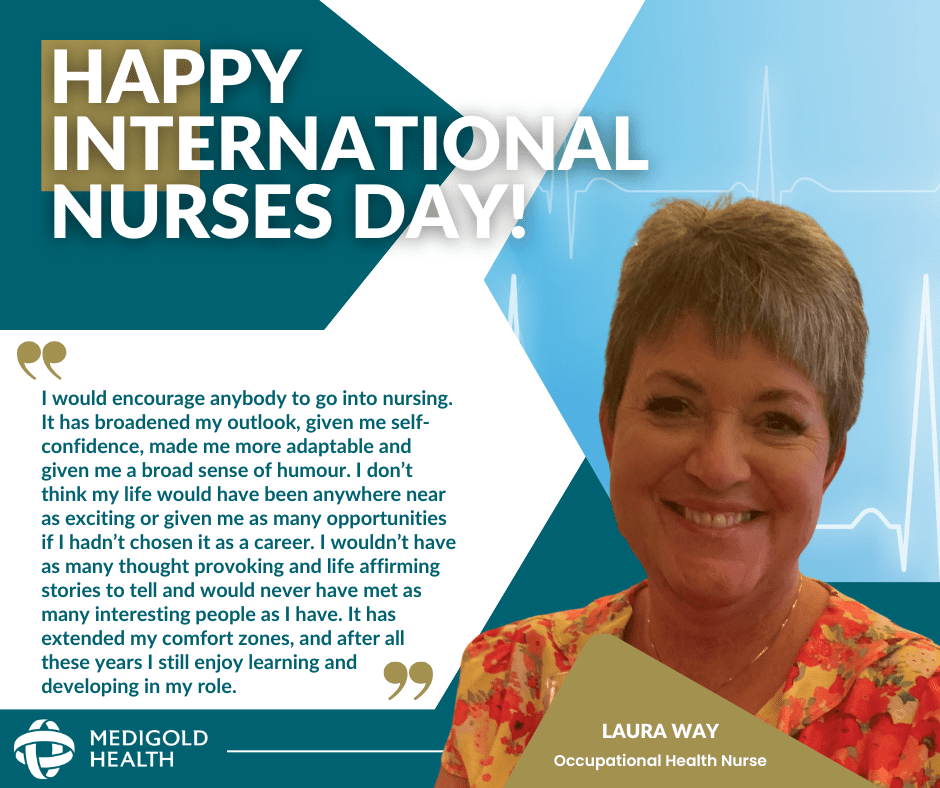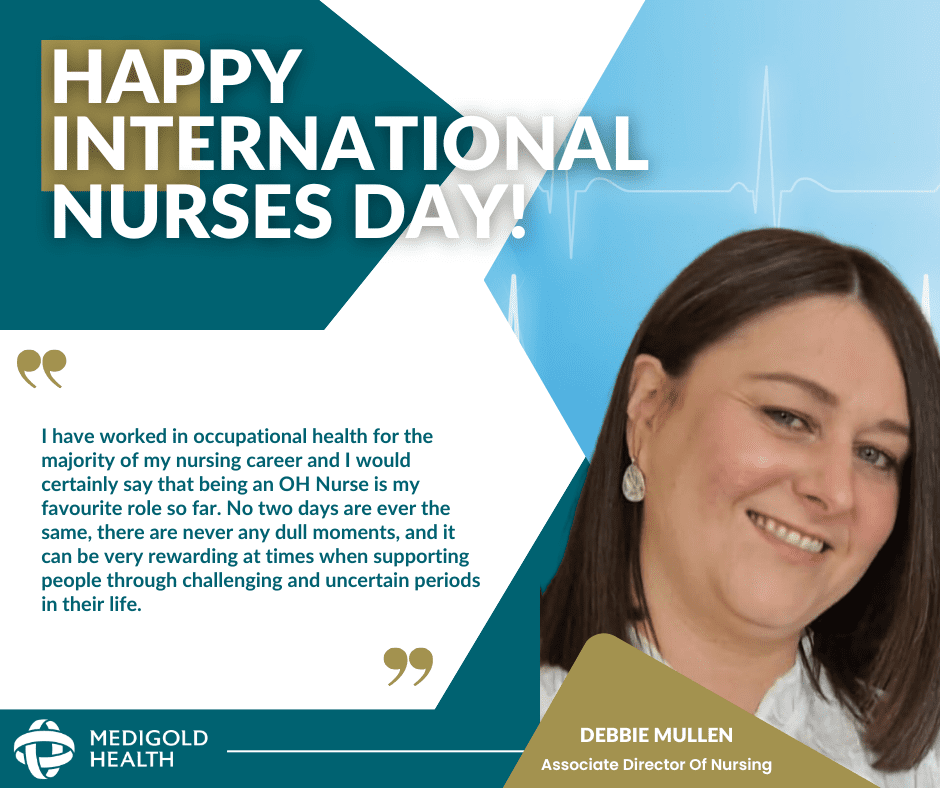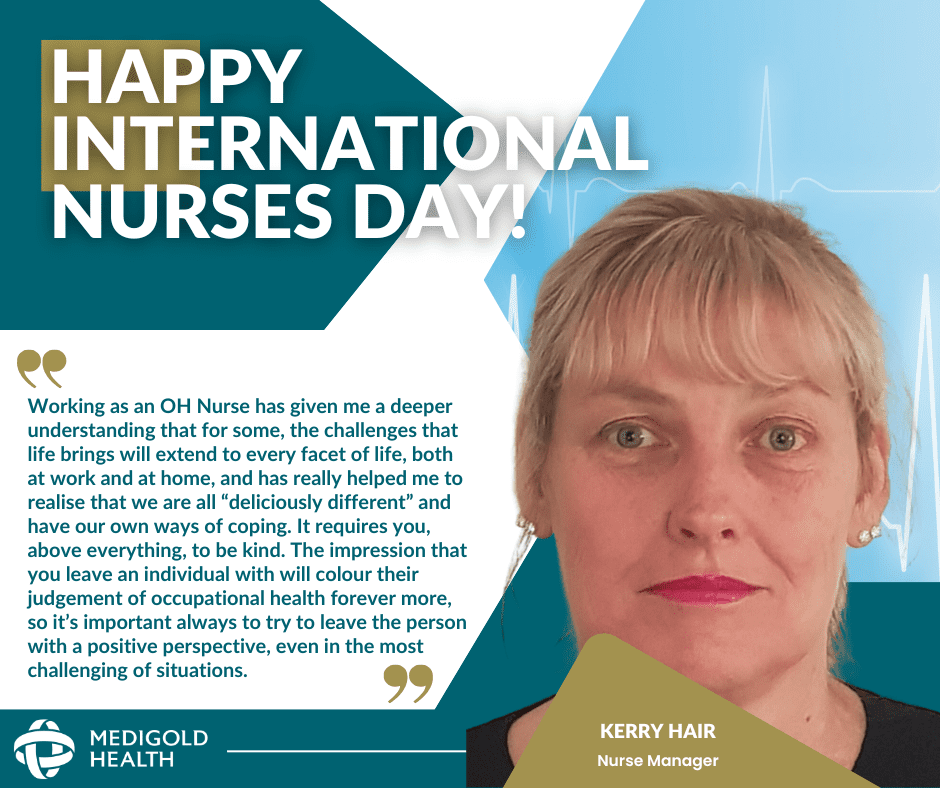Celebrating Occupational Health Nurses on International Nurses Day
In celebration of International Nurses Day, we wanted to showcase some of the exceptional nurses that we have working for us here at Medigold Health. Read on to learn more about their nursing journeys, what drew them into occupational health nursing, and why they would recommend a career in nursing to anyone.
Laura Way
Occupational Health Nurse
What does your typical day look like?
I work in the Placement Team, screening the pre-placement health questionnaires completed by our clients’ newly recruited employees and conducting follow-up telephone assessments, where required, to discuss any existing health concerns they have that might impact them in their new role and identify what support or adjustments they might need.
My morning starts by drafting a plan to allocate and rotate incoming and ongoing work out amongst the team according to the skill mix and experience of the nurses we have working each day. Once this is sent out, we then have a brief team meeting to discuss any issues or priorities and then get to work. We receive hundreds of health questionnaires a day, so it’s very fast paced.
As well as screening, I also liaise closely with our Client Services and Relationship Management Teams in dealing with client queries and helping to resolve any issues and am involved in mentoring new members of the team and providing training and support.
I really enjoy my job as it’s so varied. You get to speak to so many different people on a daily basis and I love how much I’m able to learn from them – every day is a school day. Hearing how people have dealt with trauma, difficulty, loss and change in their lives and survived despite this, listening to their insight, and finding out about the self-care and coping strategies that have worked for them is really inspiring. It’s also so rewarding when I speak to someone who has a medical condition to be able to help identify solutions that will help them stay well at work and be successful in their new role, and I always love to hear when employers have been welcoming and supportive.
What did your nurse training involve?
After leaving sixth form, I volunteered at my local hospital whilst working full time. I joined the Royal Navy in 1987 and did six weeks’ basic training before moving to Haslar Royal Naval Hospital in Hampshire. We had eight weeks’ induction training (in anatomy & physiology, activities of daily living, care plans, communication skills, pain management, social experiments and surveys, and ward visits), then 13 weeks shift working on our first ward.
Each of the next three years involved a week in nursing school doing the theory for the next module and then several months in a specialty, with a week back in school after each module. I did placements in A&E, mental health hospitals and alcohol rehab clinics, community practice clinics, midwifery, medicine and surgery, orthopaedics, paediatrics, high dependency care and operating theatres. Throughout this time, we also had exams and projects to complete.
I qualified as a Registered General Nurse in June 1990. I took part in a Leadership Course two years later, then an ENB (English National Board for Nursing, Midwifery and Health Visiting) course in Family Planning in 1993, a Leadership and Management course in 1994, and obtained my NEBOSH (National Examination Board in Occupational Safety and Health) Certificate in Health & Safety in 1996.
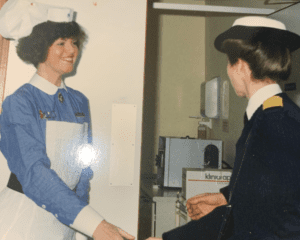
Would you encourage others to go into nursing?
Yes, I would encourage anybody to go into nursing. It has broadened my outlook, given me self- confidence and enabled me to strike up a conversation with anyone I meet (which my husband and children find very amusing!). It has also made me more adaptable, more sociable and given me a broad sense of humour. I don’t think my life would have been anywhere near as exciting or given me as many opportunities if I hadn’t chosen a career in nursing. I wouldn’t have as many thought provoking and life affirming stories to tell and would never have met as many interesting people as I have. It has extended my comfort zones, and after all these years I still enjoy learning and developing in my role.
Debbie Mullen
Associate Director Of Nursing
What was your first role after qualifying?
After qualifying, I was unsure where exactly I wanted to work, so I decided to join the NHS Nurse Bank. Bank nursing exposed me to a wide range of different working environments and areas of nursing, which not only gave me a lot of confidence but also lots of opportunities that I may not have got working in one area, allowing me to enhance my knowledge, nursing experiences and professional development more quickly and to a much greater extent than if I’d specialised straight away. It has also helped me subsequently within my occupational health career, where having diverse clinical knowledge is a key requirement.
What has been your favourite nursing role to date?
Definitely working in occupational health, as this is what I have done for the majority of my nursing career. No two days are ever the same, there are never any dull moments, and it can be very rewarding at times when supporting people through challenging and uncertain periods in their life.

What is the most challenging part of nursing?
Within OH nursing, I would say it’s the lack of awareness and understanding of the purpose of occupational health, although being able to educate people on the value of having occupational health input is definitely an aspect of the job that I really love.
What do you enjoy most about occupational health nursing?
Occupational health nursing offers you raw insight into people’s lives. It teaches you never to judge an individual because you do not ever fully know the challenges that they may have gone through or the difficulties they may be navigating day to day.
Working as an OH Nurse has given me a deeper understanding that for some, the challenges that life brings will extend to every facet of life, both at work and at home, and has really helped me to realise that we are all “deliciously different” and have our own ways of coping. It requires you, above everything, to be kind. The impression that you leave an individual with will colour their judgement of occupational health forever more, so it’s important always to try to leave the person with a positive perspective, even in the most challenging of situations.

What is the most rewarding thing about nursing?
Nursing is the most rewarding job, as no two days are ever the same. Of a day I will be dealing with individuals experiencing emotional and work-related turmoil, and at night (in my other role as a palliative care nurse), I will be caring for someone as they take their last breath in the world. Nursing is a privilege and an honour. No other job allows you to enter people’s lives in quite in the same way. People always remember “The nurse who…”
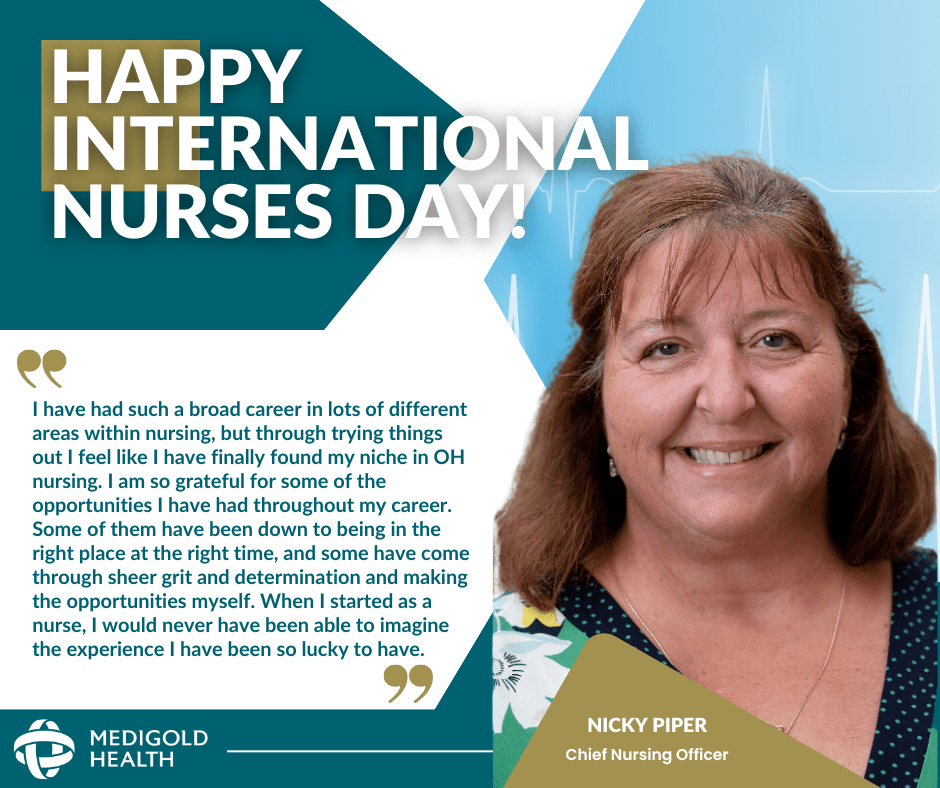
Nicky Piper
Chief Nursing Officer
Why did you move into occupational health nursing?
I moved to OH Nursing in 1998, as I had experienced so much with General Nursing and wanted the next challenge.
I spent many years working within in-house OH departments, including at the Met Police and the Daily Mail, and I made the shift to working for an OH provider in 2014 to broaden my skills and work across a variety of sectors and client bases.
I believe that my General Nursing experience plays a crucial role in my position today as it grounded me and enabled me to get a solid understanding of illnesses and their impact on an individual. Today, I am able to apply that knowledge in a commercial setting and explore the impact illness has not only on the individual, but also on their job role and their wider workplace.
I love proactively helping people to get and stay well at work.
What has been your favourite nursing role to date?
As a General Nurse, my favourite post had to be my time as A&E Sister at Kings College Hospital, London, as I never knew what was coming next! It was incredibly busy and fast-paced but also lots of fun and very rewarding, with no two days the same.
In terms of OH Nursing, my favourite role is here at Medigold Health, of course!

Would you encourage others to go into nursing?
Yes definitely! It is tough and requires a lot of dedication, but it is incredibly rewarding as a career.
For anyone entering nursing, I would recommend getting as much varied experience as possible. As it is such a diverse field, it is very hard to know what you like and love if you don’t try different areas.
I have had such a broad career in lots of different areas within nursing, but through trying things out I feel like I have finally found my niche in OH nursing.
I am so grateful for some of the opportunities I have had throughout my career. Some of them have been down to being in the right place at the right time, and some have come through sheer grit and determination and making the opportunities myself. When I started as a nurse, I would never have been able to imagine the experience I have been so lucky to have.
One thing that I have retained throughout all of my roles is my sense of humour; nursing is a serious business so it’s important to have fun!
If our nurses have inspired you to consider a career in nursing, check out the below links for information on routes into the profession:
How to become a nurse | Health Careers
Occupational health nurse | Health Careers
To find out more about our current OH Nurse and OH Advisor opportunities, visit our Careers page here.
Medigold Health are also an accredited training organisation, so if you’re looking for a new challenge and are exploring a career in occupational health, get in touch with our Chief Nursing Officer Nicola.Piper@medigold-health.com to learn about the training programmes we offer and how we can support you.
The Latest from our Blog…
Check out our blog for all of the latest news, events and updates from Medigold Health.
-

Why self-identification matters in neurodiversity
What’s behind the rise in ADHD diagnoses? Is it social media, increased awareness – or something else entirely? And how does self-identification fit into all of this? Our Lead Disability Training and Consultancy Specialist, Kath Wood, shares her expert insights on why more people are recognising themselves as neurodivergent, what[...]
Read More -

World Health Day 2025: Why your business needs to be supporting working Mums
Every year on 7th April, World Health Day gives us a chance to pause and reflect on the most pressing health issues facing people around the globe. This year’s theme – Healthy Beginnings, Hopeful Futures – puts the spotlight on maternal and newborn health, with the World Health Organisation calling[...]
Read More -

Is your workplace stressed out? Discover our top strategies for a healthier, happier workplace
April is Stress Awareness Month, and we’re taking this opportunity to spotlight the impact of stress in the workplace and its effects on employees’ mental wellbeing! We’ll also share practical strategies to help create a stress-free environment, ensuring your team feels supported and empowered to thrive. The impact of[...]
Read More

